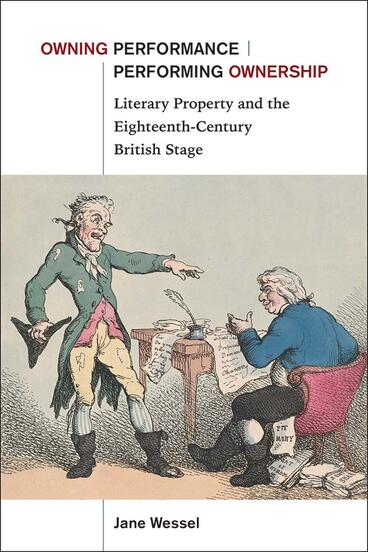Owning Performance | Performing Ownership
Literary Property and the Eighteenth-Century British Stage
How playwrights, actors, and theater managers vied for control over the performance of popular plays after the passage of England’s first copyright law
Description
In 1710, England’s first copyright law gave authors the ability to own their works, but it was not until 1833 that literary property law was extended to protect dramatic performance. Between these dates, generations of playwrights grappled for control over their intellectual property in a cultural and legal environment that treated print differently from performance. As ownership became a central concern for many, actors fought to possess their dramatic parts exclusively, playwrights struggled to control and profit from repeat performances of their works, and managers tried to gain a monopoly over the performance of profitable plays.
Owning Performance follows the careers of some of the 18th century’s most influential playwrights, actors, and theater managers as they vied for control over the period’s most popular shows. Without protection for dramatic literary property, these figures developed creative extra-legal strategies for controlling the performance of drama—quite literally performing their ownership. Their various strategies resulted in a culture of ephemerality, with many of the period’s most popular works existing only in performance and manuscript copies. Author Jane Wessel explores how playwrights and actors developed strategies for owning their works and how, in turn, theater managers appropriated these strategies, putting constant pressure on artists to innovate. Owning Performance reveals the wide-reaching effects of property law on theatrical culture, tracing a turn away from print that affected the circulation, preservation, and legacy of 18th century drama.
Jane Wessel is Assistant Professor of English at the US Naval Academy.
Reviews
“A superbly researched and convincingly argued contribution to our understanding of the development and uses of copyright in the British theater prior to the advent of performance rights. Owning Performance is essential reading for copyright historians, legal scholars of the eighteenth century, and both theater and literature scholars of the period.”
- Derek Miller
— Derek Miller, Harvard University
“This judiciously argued, impressively well-informed, and lucidly written book traces a century of shifts in theatrical, and theatrical-management, practices and conventions….I was particularly struck by Wessel’s assertion that a dramatic work’s nonpublication is not necessarily a lapse or loss but may be the product of a conscientious strategy for controlling circulation—and, indeed, no less importantly, payment.”
- Brett D. Wilson
—Brett D. Wilson, William & Mary
"By broadening the definition of publication to include not only print but performance, this book expands current conceptions of literary property and shows how, in the gaps around literary property law, the "affordances of performance" were tactically deployed by playwrights and performers. The book is particularly notable for its foregrounding of performers' creative labour."
- Eighteenth-Century Fiction
--Eighteenth-Century Fiction
"Wessel's book is a timely and lively reminder that gaining statutory recognition will not of itself be sufficient to protect economic and integrity rights if directors are unable to resist demands to cede their rights to producers or theatre managements,"
- Theatre Notebook
--Theatre Notebook
"Particularly notable is her skill and careful research in describing the individual figures that play the major roles in her stories, while also reminding us that they were real people, some more likable, some less so. For those who believe that there is much to learn from how creative personages sought to protect their works prior to the establishment of the modern intellectual property law regime, this book is for you."
- Antonios Baris
--The IPKat

